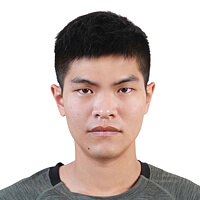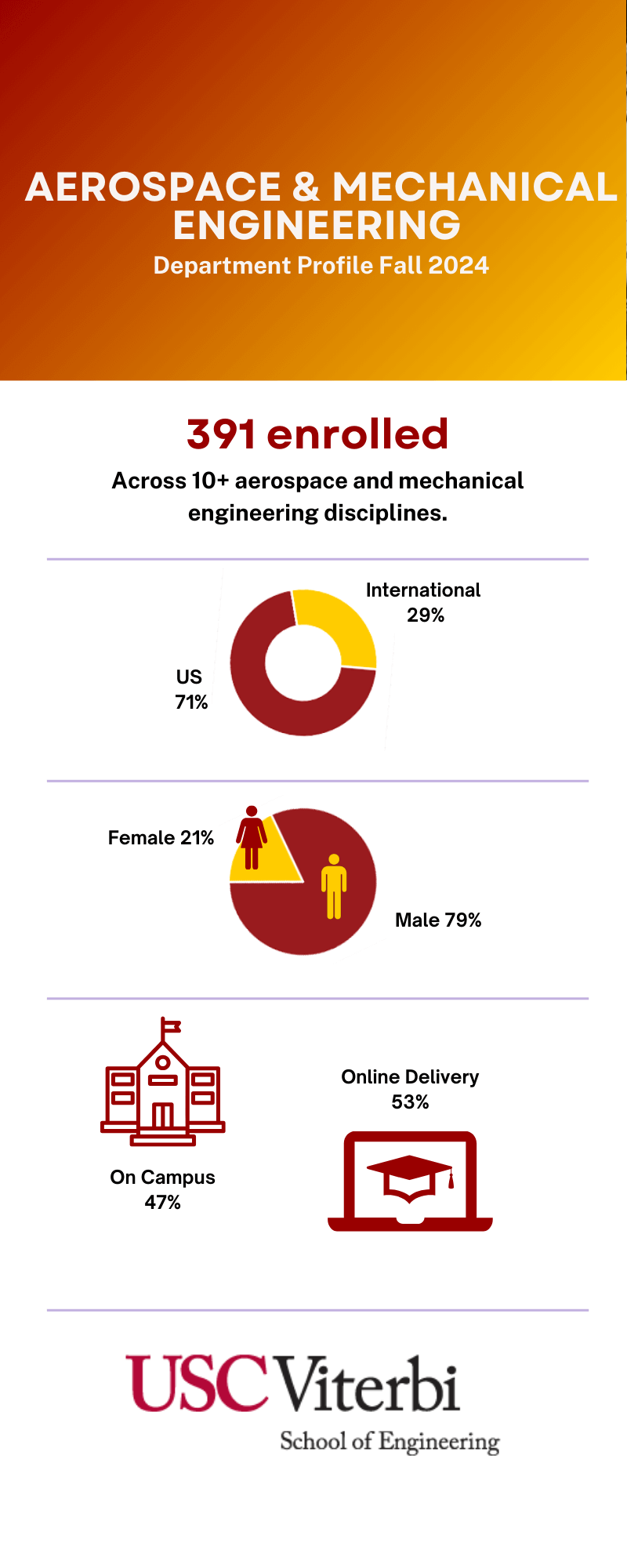The current design practice in aerospace and mechanical engineering relies on a number of numerical tools to simulate structures, heat transfer, and fluid flows (e.g., NASTRAN, FLUENT, etc.) as well as mathematical packages for analyzing data (e.g., MAPLE, MATLAB, etc.). Similarly, the availability of advanced computers has resulted in the development of new approaches in research where the computational techniques are used to explain and predict fundamental physical phenomena important in aerospace and mechanical engineering.
In an environment of a typical large aerospace company, usually different engineers specializing in one of the core areas (structures, fluids, heat transfer, combustion) will handle different aspects of designing a product before their inputs are combined. The students graduating from the USC MS in Aerospace & Mechanical Engineering (Computational Fluid and Solid Mechanics) program will be prepared to:
Interact with engineers across all core disciplines because the program prepares them in both solid and fluid mechanics; this also offers greater flexibility in job placement and advancement within a company. Pursue higher degrees (Engineer and PhD) in areas of computational mechanics and heat transfer. The coursework in the MS in Computational Fluid and Solid Mechanics Program is designed to provide a necessary background in the core aerospace and mechanical engineering disciplines (solid mechanics, fluid mechanics, heat transfer), the engineering mathematics, and the numerical techniques employed by computational packages and practical examples of their use.
International Students: This program is eligible for the OPT STEM extension.
APPLICATION DEADLINES
| SEMESTER | DEADLINE |
| Spring | September 1 |
| Fall | December 15 |
Visit our Ready to Apply page for more information
ELIGIBILITY CRITERIA
Applicants to the master's of science programs in Aerospace and Mechanical Engineering - Computational Fluid and Solid Mechanics are required to have a bachelor’s degree or be in the process of completing a bachelor's degree. Degrees in any engineering or engineering-related disciplines are frequently represented among our program applicants, including but not limited to the following:
- Aerospace Engineering
- Aeronautics
- Mechanical Engineering
- Mechatronics
Applicants without a Bachelor’s degree in the preferred majors listed above will only be considered with coursework and demonstrated proficiency in the acceptable courses listed below (or equivalent).
|
| Computer Science |
| Engineering |
| Linear Systems |
| Physics |
Applications are reviewed holistically; simply taking these courses does not guarantee admission.
APPLICATION REQUIREMENTS
The following materials are required to be included with your online application:
- Transcripts
- Resume/CV
- Personal Statement
- Letter of Recommendation (Optional)
NOTE: The GRE is not required for 2026 applications.
The following link will take you to an overview of the tuition & fees for graduate engineering students, including payment information. Both on-campus and DEN@Viterbi students pay the same tuition
TUITION AND FEES OVERVIEW
Use the link below to download the Cost of Attendance to see a summary of tuition and fees by semester. The document is a typical example and the number of courses, and time to complete the program, will vary by student.
Estimated Cost of Attendance - 27 Unit Program
 WU BOWEI
WU BOWEI
What were the main reasons you chose to pursue this graduate program at USC?
For aerospace engineering, USC is one of the best. My English is not that good and USC offers an opportunity to have an excellent English course from the American Language Institute. Also, students here are all very nice and friendly as well as eager to learn. What's most important is its location. It's really convenient and fascinating and the school is located right beside downtown LA.
What are some personal achievements or experiences you’d like to share?
There are lots of working and intern opportunities around the school. Every couple of months there are events held by the career center. I am a research assistant, and have learned a lot from the position.
What advice would you give future Viterbi students?
Explore your life in the USC and challenge yourself everyday. Alway beat yesterday and step out of your comfort zone. As an engineer, we have plenty of chances to explore the future. Don't be afraid. Just do it!
Alumni Employment - 2022*
(Companies & Job Titles)
-
Anemostat - Mechanical Engineer
-
Acqubit - Staff Engineer
-
Axiom Materials Inc - Operations Engineer
-
Boeing - Sr. Mechanical Design & Analysis Engineer, Mechanical Structural Engineering Manager, SW Integration & Test Manager, System Engineer
-
Micron Technology - Diffusion Equipment Engineer
-
Quartus Engineering - Structural Analysis Engineer
* Information is based on a voluntary survey and should not be interpreted as a comprehensive view of the 2022 graduating class.
This program is also available online to professional engineers through DEN@Viterbi. Because the DEN@Viterbi program provides a fully equivalent academic experience, the degree a USC engineering student earns is the same whether they are on-campus or online.
If you are interested in beginning classes as a DEN@Viterbi student next semester, explore the requirements and steps to enrolling as a Limited Status Student.
Learn More About DEN@Viterbi
Detailed Program Curriculum and RequirementsSchedule of Classes
DEN@VITERBI ONLINE COURSE OFFERINGS
The following courses and program requirements serve as program planning for DEN@Viterbi students. Course offerings and availability are subject to change. Please consult with advisor if you have any questions.
| General Requirements for Graduation Without Thesis |
| 27 units total. |
| Applied Math Requirement |
| Select one course - 4 units total |
| AME 525 | Engineering Analysis (4 units) |
| AME 526 | Partial Differential Equations for Engineering Applications (4 units) |
| Core Requirements |
| 4 courses, 15 units total - Students must choose either AME 509 OR CE 507. |
| AME 530a | Dynamics of Incompressible Fluids (4 units) |
| AME 535a | Introduction to Computational Fluid Mechanics (3 units) |
| AME 509 | Applied Elasticity (4 units) OR CE 507 |
| CE 507 | Mechanics of Solids I (4 units) OR AME 509 |
| CE 529 | Finite Element Analysis (4 units) |
| Core Elective in Fluid/Solid Dynamics |
| 1 course, 4 units total. |
| AME 506 | Continuum Mechanics (4 units) |
| AME 511 | Compressible Gas Dynamics (4 units) |
| AME 521 | Engineering Vibrations II (4 units) |
| AME 529 | Aircraft Structures Analysis (4 units) |
| Core Elective in Numerical Methods |
| 1 course, 3-4 units total. |
| AME 404 | Computational Solutions to Engineering Problems (4 units) |
| MASC 575 | Basics of Atomistic Simulation of Materials (3 units) |
Please complete the following form for more information.



